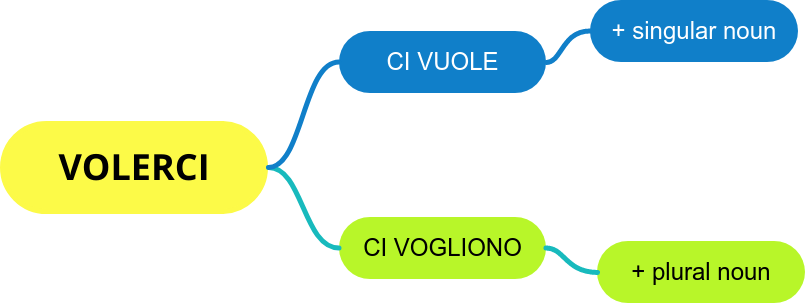What exactly is an Italian pronominal verb? It’s the kind of verb that has pronouns and particles added to it that modify its meaning. The particle in this case is ci. Learn more about How to use the Italian pronominal verb VOLERCI and how to use it to avoid mistakes.
What does it mean VOLERCI?
Volerci (verb volere + ci) is an idiomatic expression meaning :
- to be necessary – to describe the need for something
- to take – the amount of time required to complete a task.
Read the explanation to learn more.
🔍 The particle “CI” doesn’t mean anything. It only gives the verb an idiomatic meaning.
It only has two forms: one for singular and one for plural. “Essere” is the auxiliary verb for “volerci.”
Examples:
Per arrivare in centro ci vogliono 20 minuti! (Per arrivare in centro sono necessari 20 minuti!)
EN – To get to the centre it takes 20 minutes!)
Per riparare il lavandino ci vuole l’idraulico. (Per riparare il lavandino è necessario l’idraulico)
EN – It is necessary a plumber to repair the sink.
How to use the Italian pronominal verb VOLERCI

How To Use “VOLERCI”
Volerci is used in:
Depending on whether the noun following is singular or plural.
The third-person singular
Ci vuole un’ora (ora is singular) per andare a Fiumicino (It takes one hour to get to Fiumicino)
Ci vuole molto coraggio (coraggio is singular) per… (It takes a lot of courage to… )
The third person plural
Ci vogliono tre ore (ore is plural) per andare a Firenze (It takes three hours to get to Firenze)
Quante uova ci vogliono (uova is plural) per fare la torta al cioccolato? (How many eggs do you need to make a chocolate cake?)
Do you want to use VOLERCI in the past?
The auxiliary verb for “volerci” is “ESSERE”.
Ci è voluta un’ora per andare a Milano ➠ ora is feminine singular
Ci sono volute tre ore per andare a Milano ➠ ore is feminine plural
Remember to agree to the past participle with the subject when using the verb essere as an auxiliary.
What’s next?
You might want to keep learning Italian online with these free resources:










Leave a Reply